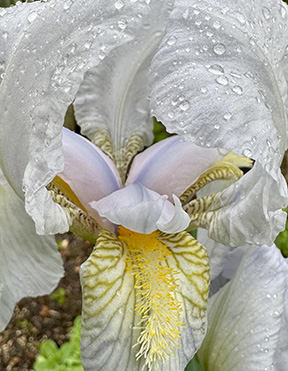 We see from afar. If we’re lucky, maybe we catch a brief glance, a quick peek, a first impression of something truly wondrous or beautiful, and sometimes that’s all we get. But what if we took the time to really focus our attention and inspect the details, to absorb all that there is to see in something as common as a flower? Would it change anything? Would we see the wider world more clearly, or would we just get lost in reverie like Ferdinand the Bull who would rather sit under his favorite cork tree, smelling the flowers and watching the butterflies, than fight in the great Plaza de Toros in Madrid?
We see from afar. If we’re lucky, maybe we catch a brief glance, a quick peek, a first impression of something truly wondrous or beautiful, and sometimes that’s all we get. But what if we took the time to really focus our attention and inspect the details, to absorb all that there is to see in something as common as a flower? Would it change anything? Would we see the wider world more clearly, or would we just get lost in reverie like Ferdinand the Bull who would rather sit under his favorite cork tree, smelling the flowers and watching the butterflies, than fight in the great Plaza de Toros in Madrid?
A few years ago, my friend Smokey gifted us with some Bearded Iris bulbs for our garden. Late April is their moment to shine. They’re not in flower for long, but when they do bloom, they are magnificent. Their subtle hues, their hint of fragrance, their graceful sway can create some of my favorite springtime moments. But I’ve always admired them from a distance. So, yesterday I decided to take out my camera to get a closer look. That’s when I began to see them differently. For a moment, I got lost in their hidden inner beauty: their sturdy stalks, the feminine fragility of their pistils, all the delicate pastel shades hidden within the folds of their petals, even the dew drops they wore like jewels in the cool morning sunlight. Everything I beheld led me deeper into the mystery that is the natural world. How, I wondered, in the midst of all this political chaos and human pain, does Mother Nature manage to pull it off so gracefully?
As I’m sure you know by now, Pope Francis died last week. I am not Catholic so I have no particular institutional affection or bias for neither the pontiff nor the Vatican. But when I looked closely at Francis and his life, I saw the personification of many of the qualities I hold most dear in a person: simplicity, humility, empathy, a lightness of being that radiated both joy and affection for everyone around him, especially the weakest among us. He was that lovely flower growing in the garden who caught my attention and made me want to look more closely, and when I held him up to that kind of scrutiny and close inspection, I was all the more impressed with what I saw—a human authenticity that transcended all the power and pomp of his ecclesiastical office. I’m sure Francis had his flaws—don’t we all?—but whatever flaws there were in the man paled in comparison to the way he tended his garden. May he rest in peace.
But back to those bearded irises in our own little garden. It might have been sufficient to enjoy them from afar, but when I took a moment to look closer at their intricate beauty, I caught a glimpse of all I had been missing. I would tell you what that was, but William Wordsworth says it much more elegantly than I ever could:
What though the radiance
Which was once so bright
Be now for ever taken from my sight,
Though nothing can bring back the hour
Of splendor in the grass,
Of glory in the flower,
We will grieve not, rather find
Strength in what remains behind;
In the primal sympathy
Which having been must ever be;
In the soothing thoughts that spring
Out of human suffering;
In the faith that looks through death,
In years that bring the philosophic mind.
I’ll be right back.
Jamie Kirkpatrick is a writer and photographer who lives on both sides of the Chesapeake Bay. His work has appeared in the Washington Post, the Baltimore Sun, the Philadelphia Inquirer, the Pittsburgh Post-Gazette, the Washington College Alumni Magazine, and American Cowboy Magazine. His most recent novel, “The Tales of Bismuth; Dispatches from Palestine, 1945-1948” explores the origins of the Arab-Israeli conflict. It is available on Amazon and in local bookstores.






